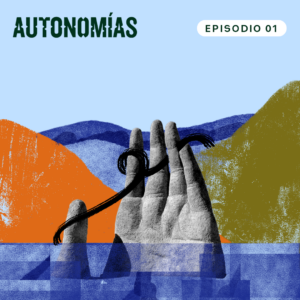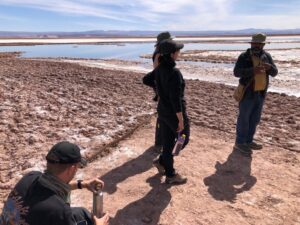Frustrated with a lack of media coverage of communities’ experiences with self-governance, Mexican communicator Pamela Carmona created the Autonomías Podcast.

Autonomías Podcast tells the stories of communities and individuals who are putting autonomy and self-management into practice in their territories. (Credit/Courtesy)
"In the media, [self-government experiences] are shown as inspiring examples, as the exception to the rule,” Carmona told LJR. “When in Latin America, at least in Colombia and Mexico, communities have always organized themselves in the shadow of the state.”
With the support of the organization SembraMedia and GNI Startups Lab, an accelerator for independent digital media outlets, Carmona launched Autonomías Podcast to learn how people or communities in Latin America solve their problems of access to water, housing, health, or education, among others, without government support.
This initiative was launched Aug. 2, 2023, and is distributed every 15 days along with a newsletter of the same name. Currently it averages about 150 listeners per episode.
The podcast "was selected by the [GNI Startups Lab] jury for its regional scope; the originality of the subject matter; and the production work done by Carmona," Sebastian Auyanet, strategic consultant at SembraMedia and the mentor assigned to develop the podcast together with Carmona, told LJR.
At the same time, according to Auyanet, it was also selected because of the communicator's background: "She comes from organizations related to the subject, which makes her a reference within that community space, and that is very important for a niche media like the one she is creating."
When Carmona speaks of communities in Latin America, she is referring to groups of people organized around their shared identity –whether Indigenous or peasant–, shared geographic space, or a common goal.
When she speaks of self-governance, she refers to shared decision-making by a group of people or a community, as well as the influence they may have on decisions made about problems that affect them. For example, how a group of workers can influence a decision about a problem that affects their work in a factory.
In the context of the podcast, self-governance is the way in which "a group of people self-fulfills a need they have," she said.
The problem, though, she said, is a lack of these kinds of success stories in the media. Auyanet agrees with Carmona and adds that “these approaches appear in the media only in very specific matters, when housing is covered, for example.”
The first episode of Autonomías Podcast is about community water management in the town of San Pedro de Atacama, in the middle of the Chilean desert.

Pamela Carmona talking with Carlos Vega, one of the leaders of the Coyo community in San Pedro de Atacama, Chile. (Credit/Courtesy)
In Chile, “the communities have managed to organize themselves and find loopholes in the law to obtain the rights to use the San Pedro river and obtain water for their crops," Carmona said.
Another story told in the podcast is that of a community in Rancho Quemado, Costa Rica, an area that is home to 2.5% of the world's biodiversity. The episode shows how this community went from being one of hunters initially, to carrying out ecological monitoring and preserving the native fauna of the area. According to Carmona, this is a story that exemplifies community conservation in action.
What Carmona is trying to do with Autonomías Podcast is "to go beyond this State and citizen participation framework. Rather, to speak of ‘direct action,’ which means speaking of self-management. That is, to take the problems and solve them yourself without going to an external or high authority."
Carmona said that in the media stories of autonomy and self-management are often told as unique experiences and isolated from each other, when, in reality, they are immersed in larger networks and movements.
"There is a whole movement of building autonomies throughout our territory that is much larger and real, and is not just an inspiring and special example that arose in a particular territory but is difficult to replicate elsewhere," she said.
According to Auyanet, the journalistic value of Autonomías Podcast is to "document the self-management efforts that are being made in different parts of Latin America. The stories told in the podcast are interesting stories that open our minds to other perspectives and ways of organizing ourselves, and that is also what journalism does.”